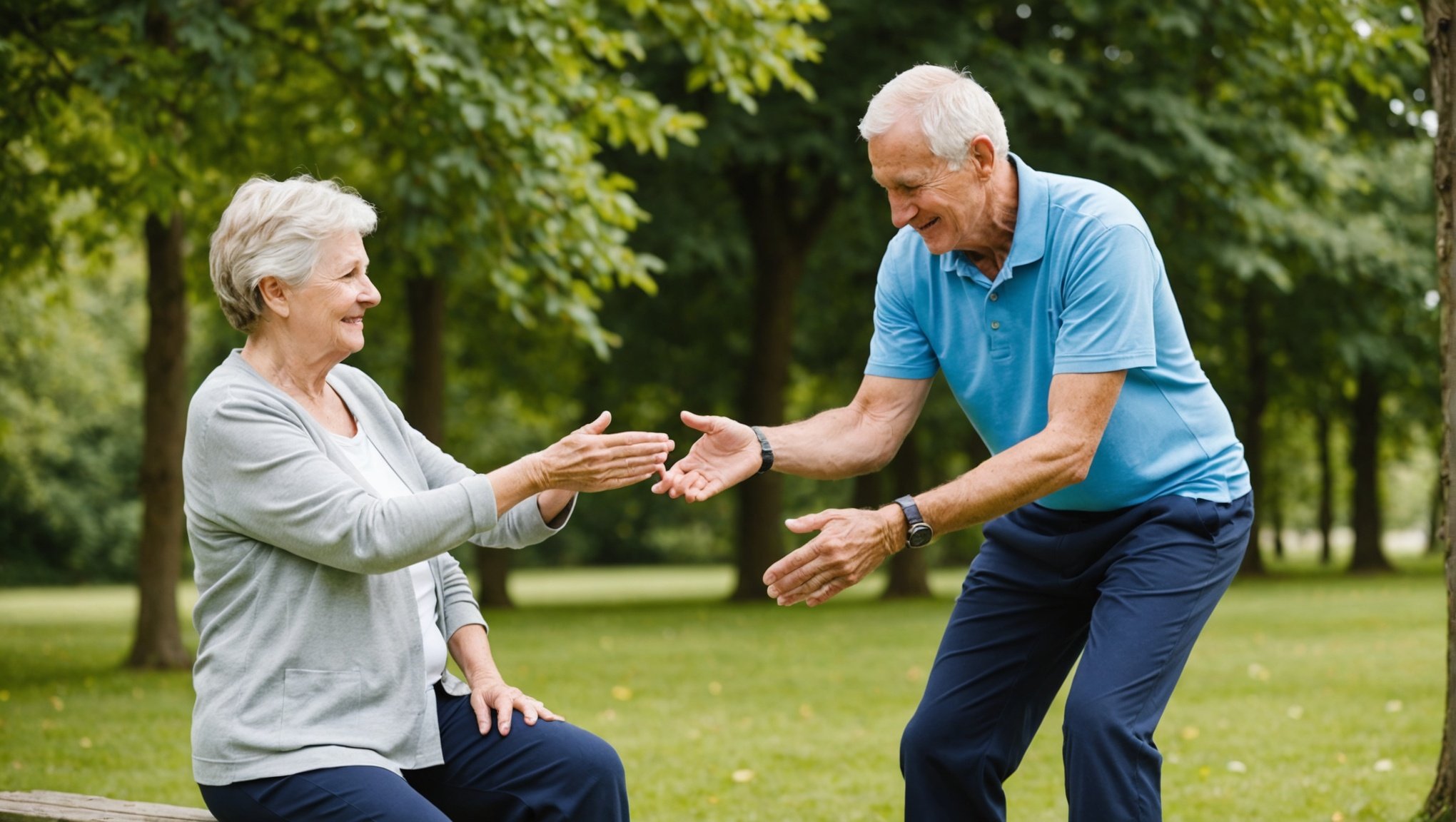Arthritis affects millions of seniors in the UK, making daily activities challenging. Finding gentle exercises can help alleviate pain, improve mobility, and enhance overall well-being. This guide highlights the top gentle exercises tailored for seniors living with arthritis. Discover practical options that not only minimize discomfort but also encourage a more active lifestyle. Embrace an empowered approach to exercise that respects your body's needs while promoting strength and flexibility. Your journey to better health starts here.
Overview of Arthritis in Seniors
Understanding arthritis is crucial for seniors as it significantly affects their health and well-being. This condition involves inflammation of the joints, leading to pain and stiffness, which can severely impact daily activities. Although arthritis is common among the elderly, it doesn't have to dictate one's lifestyle.
This might interest you : Exploring the Eco-Friendly Advantages of Electric Scooters in Urban UK: A Sustainable Transportation Solution
Common Types of Arthritis
Rheumatoid arthritis and osteoarthritis are the most prevalent forms affecting seniors. Osteoarthritis results from wear and tear on the joints, while rheumatoid arthritis is an autoimmune disorder causing inflammation. Both types can lead to significant discomfort and mobility challenges for the elderly.
Importance of Staying Active
It's essential for seniors with arthritis to remain active. Regular physical activity helps maintain joint function and reduces stiffness. Here are some recommended activities:
Also read : Key Vitamins and Minerals Every UK Teen Needs for Healthy Growth During Puberty
- Walking: Encourages joint movement without excessive strain.
- Swimming: Provides a low-impact environment allowing full range of motion.
- Stretching: Enhances flexibility and reduces tension.
Incorporating these activities into daily routines can improve overall health and manage arthritis symptoms effectively. Remember, consulting with a healthcare professional before starting any exercise program is advisable, ensuring safety and appropriateness for individual needs.
Benefits of Gentle Exercises for Seniors
Exploring the benefits of gentle exercises for seniors can reveal significant improvements in both physical and mental health. These exercises enhance mobility and strength, crucial for maintaining independence and reducing the risk of falls. By engaging in activities such as tai chi or yoga, seniors can improve balance and flexibility, which are vital for everyday tasks.
Regular exercise has been shown to boost mental health, reducing symptoms of anxiety and depression. It provides a sense of accomplishment and can elevate mood through the release of endorphins. This is particularly important for seniors who may face isolation or loneliness.
Moreover, gentle exercises often foster social engagement, offering opportunities to connect with peers. Participating in group classes or community walks can create a supportive environment, encouraging consistent participation and building friendships.
Benefits Summary
- Improved Mobility: Increases range of motion and ease of movement.
- Enhanced Strength: Builds muscle mass, supporting joint health.
- Mental Health Boost: Reduces stress, anxiety, and depression.
- Social Interaction: Encourages community involvement and support.
Incorporating these gentle exercises into daily routines can profoundly impact seniors' quality of life, promoting both physical and emotional well-being.
Recommended Gentle Exercises
Exploring low-impact exercises is crucial for seniors with arthritis. These activities minimize stress on joints while improving overall health.
Stretching and Flexibility Exercises
Flexibility is essential for reducing stiffness. Stretching exercises like seated toe touches or shoulder rolls can gently enhance mobility. Perform these movements slowly, holding each stretch for 15-30 seconds. Repeat 2-3 times, focusing on breathing steadily throughout.
Strength Training with Light Weights
Building strength supports joint health and alleviates arthritis symptoms. Use light weights or resistance bands for exercises such as bicep curls or leg lifts. Start with 1-2 sets of 10-15 repetitions, gradually increasing as strength improves. Always prioritize correct form to prevent injury.
Balance and Coordination Activities
Improving balance is vital for preventing falls. Simple activities like standing on one foot or walking heel-to-toe can enhance coordination. Practice these exercises daily, aiming for 5-10 minutes, and use a chair or wall for support if needed.
- Flexibility: Reduces joint stiffness
- Strength: Supports joint stability
- Balance: Prevents falls
Incorporating these low-impact exercises into daily routines can significantly benefit seniors with arthritis, promoting a healthier and more independent lifestyle.
Exercise Precautions for Seniors with Arthritis
Understanding the importance of safety precautions is crucial for seniors with arthritis when engaging in exercise routines. Consulting with healthcare professionals is a vital step before starting any new activity. They can provide personalized advice tailored to individual health needs and arthritis severity levels.
Recognizing Overexertion
Overexertion can lead to increased pain or injury. Seniors should be attentive to signs such as excessive fatigue, joint swelling, or persistent discomfort. If these symptoms occur, it's advisable to rest and possibly adjust the exercise intensity.
Modifications for Arthritis Severity
Exercises should be modified to accommodate different levels of arthritis severity. For those with mild symptoms, low-impact activities may suffice. However, individuals with severe arthritis might need to limit range of motion and use supportive devices.
- Consult Professionals: Ensure exercises are suitable for your condition.
- Monitor Symptoms: Adjust activities if discomfort increases.
- Adapt Exercises: Tailor movements to your arthritis severity.
These safety precautions allow seniors to exercise effectively without compromising their health. By recognizing personal limits and making necessary adjustments, seniors can maintain a safe and beneficial exercise routine.
Local Resources for Exercise Classes in the UK
Exploring exercise options tailored for seniors in the UK can significantly enhance their well-being.
Community Centers Offering Classes
In the UK, numerous community centers provide exercise classes specifically designed for seniors. These centers often host a variety of programs, such as tai chi and gentle aerobics, which cater to different fitness levels. Engaging in these exercise classes not only promotes physical health but also encourages social interaction, fostering a sense of community among participants.
Online Platforms for Virtual Classes
For those preferring to exercise from the comfort of their homes, online platforms offer virtual exercise classes tailored for seniors. These classes provide flexibility and accessibility, allowing participants to join sessions at their convenience. Popular platforms often include a range of options, from yoga to strength training, ensuring that seniors can find a program that suits their needs.
Recommendations for Senior-Focused Fitness Programs
When selecting a fitness program, it's crucial to focus on those specifically designed for seniors. Look for programs that emphasize low-impact activities and are led by instructors experienced in working with older adults. This ensures that the exercise classes are both safe and effective.
- Community Centers: Offer diverse classes
- Online Platforms: Provide flexible options
- Senior-Focused Programs: Ensure safety and effectiveness
By exploring these resources, seniors in the UK can find suitable exercise classes that cater to their unique needs and preferences.
Expert Advice from Healthcare Professionals
Uncover insights from experts to enhance senior health management.
Insights from Physiotherapists
Physiotherapists emphasize the importance of tailored exercise plans for seniors. These plans should focus on maintaining joint flexibility and reducing pain. A physiotherapist might recommend exercises such as water aerobics or stationary cycling, which are gentle yet effective for arthritis management.
Recommendations from Rheumatologists
Rheumatologists provide critical insights into managing arthritis. They often suggest a combination of medication and physical activity to alleviate symptoms. A rheumatologist may advise on specific exercise regimens that consider the individual's arthritis severity and overall health status.
Importance of Customized Exercise Plans
Creating a personalized exercise plan is crucial for seniors with arthritis. Such plans should be developed in consultation with healthcare professionals to ensure they meet the individual's unique needs. A customized plan might include:
- Low-impact exercises: To minimize joint strain
- Strength training: To support joint health
- Flexibility exercises: To enhance range of motion
Expert advice from healthcare professionals ensures that seniors engage in activities that are both safe and beneficial. By following these tailored recommendations, seniors can effectively manage their arthritis and improve their quality of life.
Testimonials from Seniors
Real-life experiences highlight the transformative power of exercise.
Personal Success Stories
Many seniors have shared their testimonials on how incorporating regular exercise has significantly improved their mobility. Jane, a 72-year-old participant in a local tai chi class, noted, "I never imagined that gentle movements could make such a difference. My joints feel more flexible, and I can move with ease." Such feedback emphasizes the positive impact of staying active.
Feedback on Specific Exercises
Seniors often find particular exercises more beneficial than others. For example, water aerobics has been praised for its low-impact nature. "The water supports my body, making it easier to move," says Tom, 68. These testimonials highlight the importance of finding the right exercise to suit individual needs.
Encouragement for New Participants
Hearing from peers can be a powerful motivator. Seniors who have experienced the benefits of exercise often encourage others to join. "Don't be afraid to start," advises Mary, 75. "The classes are welcoming, and the benefits are worth it."
- Improved Mobility: Enhanced joint function
- Positive Feedback: From diverse exercise classes
- Motivational Support: Encouragement from peers
These testimonials illustrate the profound impact exercise can have on seniors' lives, inspiring others to take the first step toward better health.
Nutrition and Lifestyle Tips to Complement Exercise
Enhancing overall well-being through diet and lifestyle adjustments.
The Role of Diet in Managing Arthritis Symptoms
A balanced diet plays a crucial role in managing arthritis symptoms for seniors. Consuming anti-inflammatory foods can help reduce joint pain and stiffness. Omega-3 fatty acids, found in fish like salmon and sardines, are particularly beneficial. Additionally, incorporating fruits and vegetables rich in antioxidants, such as berries and leafy greens, supports joint health.
Recommended Foods for Joint Health
Certain foods are especially recommended for joint health. Consider these options:
- Fatty Fish: Rich in Omega-3s
- Nuts and Seeds: Provide essential nutrients
- Whole Grains: Reduce inflammation
- Olive Oil: Contains anti-inflammatory properties
These foods contribute to maintaining healthy joints and reducing arthritis symptoms.
Importance of Hydration and Overall Wellness
Staying adequately hydrated is vital for overall wellness. Water helps lubricate joints, making movement easier for seniors. Aim for at least 8 glasses of water per day, adjusting based on individual needs and activity levels. Alongside proper hydration, maintaining a healthy lifestyle that includes regular exercise and stress management can significantly enhance quality of life.
By integrating these nutrition and lifestyle tips, seniors can effectively complement their exercise routines, promoting better health and well-being.
Resources for Further Information
Exploring additional resources can empower seniors with arthritis.
Books and Publications on Arthritis and Exercise
Diving into books and publications can provide valuable insights into managing arthritis. Titles like "The Arthritis Foundation’s Guide to Good Living with Arthritis" offer comprehensive advice on exercise and lifestyle adjustments. These resources can be found at local libraries or bookstores, providing practical strategies for seniors.
Websites and Online Communities for Support
Engaging with websites and online communities offers ongoing support and information. Platforms such as the Arthritis Foundation and Versus Arthritis provide forums where seniors can share experiences and advice. These communities foster a sense of belonging and offer up-to-date information on managing arthritis.
National and Local Arthritis Organizations in the UK
National and local organizations play a crucial role in supporting seniors. Organizations like Arthritis Action and the National Rheumatoid Arthritis Society offer resources and programs tailored to seniors. These organizations often provide workshops, exercise classes, and educational materials to help manage arthritis effectively.
- Books: In-depth guides
- Websites: Online support
- Organizations: Local resources
By utilizing these resources, seniors can gain a deeper understanding of arthritis and find support tailored to their needs.
Conclusion and Call to Action
Encouraging seniors to embrace an active lifestyle and explore exercise options.
Start Your Journey
Taking the first step towards a more active lifestyle is crucial for seniors. Engaging in gentle exercises not only enhances physical health but also contributes to mental well-being. Activities like tai chi and water aerobics can be excellent starting points. These exercises are designed to be low-impact, making them suitable for those with joint concerns.
Finding Local Classes
Discovering local resources is key to maintaining an active lifestyle. Many community centers offer classes specifically tailored for seniors, providing a supportive environment. Here are some tips for finding classes:
- Visit Local Centers: Check bulletin boards for class schedules.
- Ask Healthcare Providers: They often recommend suitable programs.
- Consult Peers: Fellow seniors may share valuable insights.
Embrace an Active Lifestyle
Maintaining an active lifestyle is essential for overall health. Regular exercise not only improves mobility but also reduces the risk of chronic diseases. By staying active, seniors can enjoy a higher quality of life, remaining independent and engaged in their communities.
- Start Now: Begin with simple activities
- Explore Resources: Utilize local offerings
- Stay Committed: Consistency is key
Encourage yourself or a loved one to explore these options, and take control of your health and well-being.











